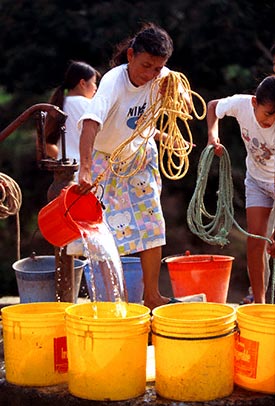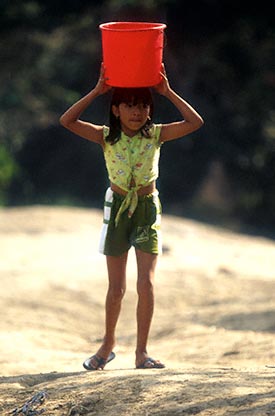
The Montecristi Foundation, Inc.: A non-profit, private operating foundation.
Our mission is to preserve, and to re-grow, the centuries-old art of hand-weaving the legendary Montecristi “Panama” hats.
We are but a match in a hurricane. We do a little bit in a little village. We make a few lives a little better, once in a while. It’s not much, but it’s something. Perhaps, after seeing what we are doing now, you will decide to help us do a little more.
Funding for Foundation projects and programs comes from The Panama Hat Co. of the Pacific, Inc. and direct donations from people like you (hint, hint).
Specific programs funded and administered by The Montecristi Foundation, Inc.:
- Weaving School
- Master Weaver Certification
- Earthquake Relief
- Medical Care
- Safety Masks for Weavers
- Eyeglasses for Weavers
- More Eyeglasses
- Water Project
- Soccer Team
- Denomination of Origin Protection
- Fair Trade
- Fighting Montecristo Cigars
1. Weaving School
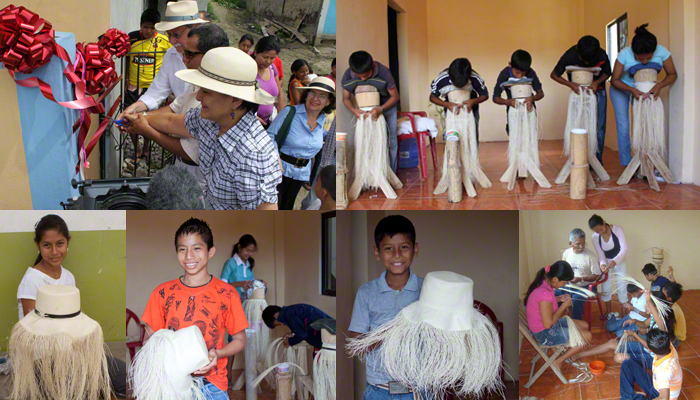
Summary: Established January of 2011, the hat weaving school is in the village of Pile (pee-lay), where the very finest Montecristi hats have been woven for . . . oh, a couple of hundred years.
Tuition is free. Class size is limited. Two teachers. The Montecristi Foundation pays salaries, rent, and all school-related costs, including a free meal for the students, which they eat during their break. (Hmm, should I ask for donations here, or not? Better not. People get tired of charities begging all the time.)
The goal is to keep the art alive. To teach the next generation to make the magic of their fathers and mothers, the magic of their great-great-grandfathers and great-great-grandmothers, the magic of their nation's most famous creations, the magic that elevates simple straw to fine art.
SEE VIDEO » Students, teachers, a dog, cute kids, catchy music – what’s not to love?
2. Master Weaver Certification
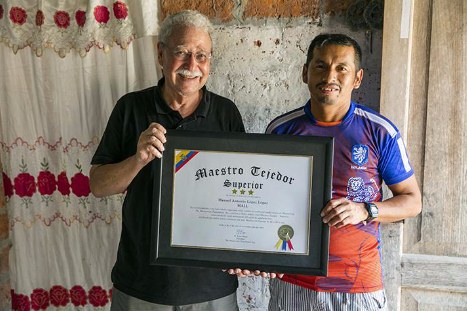
Summary: This important program was launched in November 2015 with the certification of four Master Weavers at three different levels of skill and achievement. We will partner with the government of Ecuador to execute this program.
3. Earthquake Relief Fund
Beginning April 16, 2016, coastal Ecuador was rocked by a series of powerful earthquakes. The most powerful was 7.8. Hundreds were killed, thousands were homeless. The quakes continued unpredictably for several months. One quake epicenter was Montecristi itself, toppling the iconic church steeple. The village of Pile was hard hit, and many families were without food. We raised several thousand dollars and distributed food to those in need.
4. Medical Care
When we first began to provide free medical care to the village of Pile back before the turn of the century, ours was the only medical care available in the village. The government of Ecuador had not yet “discovered” Pile. We started with a couple of experimental medical days, funded by The Panama Hat Co. of the Pacific, Inc.
We hired a physician from Montecristi city who brought two assistants and his best guess as to what medications might be needed. They gave physical examinations, listened to complaints and symptoms, prescribed medications when appropriate, and advised patients on basic health maintenance, diet, etc. (mostly ignored, same as I do).

These free medical days were so popular with the weavers and their families (not a surprise) that we continued the program for several years. We funded free medical days in Pile several times per year, as many as we could afford.
The government of Ecuador finally discovered the village in 2007 and now assigns a physician just out of school to provide care for Pile on a regular schedule. So we modified our own program to provide the most help possible within our small budget.
We still fund free eye exams and eyeglasses, safety gear to prevent health problems, and occasional extraordinary help in emergency situations.
5. Safety Masks for Weavers
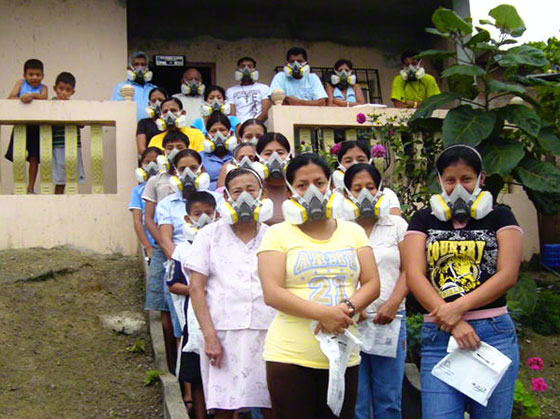
Sulfur powder is critically important to the traditional process of creating genuine Montecristi hats. We have sometimes provided free sulfur powder for weavers. So we have also provided free safety masks to protect weavers from the free sulfur powder.
This is the first time in history that the weavers have had any way to protect themselves from the potentially hazardous sulfur fumes that are an essential part of the process.
6. EyeGlasses for Weavers
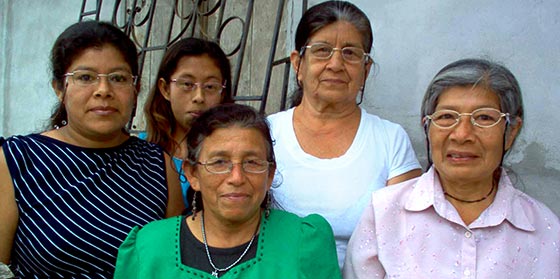
The Foundation brought an optometrist to Pile, provided free eye exams, and free eyeglasses. I was there when the optometrist came, and I was shocked to discover that most of the weavers literally couldn’t see what they were doing. I had high hopes that a dramatic increase in fineness and evenness of weave would follow immediately. I was wrong. Touch and feel must be more important than sight when weaving. (See related story about a child’s eye glasses).
7. More Free Eyeglasses
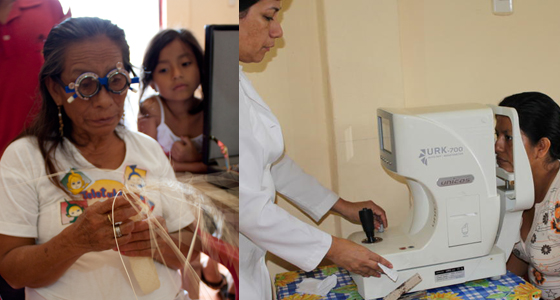
Eyes change. New glasses were needed. So, in July 2011, The Montecristi Foundation again funded an optometrist to go to Pile. This time, with more sophisticated equipment than anyone has ever seen in Pile, including those with perfect eyesight.
Eyes were examined. Prescriptions were written. Eyeglasses were made and distributed. All free. The service was offered to all the weavers, not only to those whose hats I buy.
We will fund new exams and eyeglasses again in 2016. Maybe you could see your way to help.
8. Water Project
Ugly beauty. Ugly to look at, but beautiful to have in your neighborhood if you live in Pile.
It is a water storage tank to provide a safe water supply for the village. The old water storage tank was, well, old. There were serious problems with it, including health issues. It needed to be replaced.
Steve Singer, CEO of Hartford York, joined with The Montecristi Foundation to fund the Pile Water Project of 2008. Steve and I agreed to donate funds to buy the materials, and the people of Pile agreed to provide the labor. Perfect. We'll help you, if you'll help yourselves.
We hired an architect to select the best site, to make a drawing of the proposed system, and to provide a cost estimate. He did his part, we bought and delivered the materials, and the people of Pile build the storage tank.
The project is a total success. Still providing water to the village of Pile, as I write this in 2016.
Water is life.
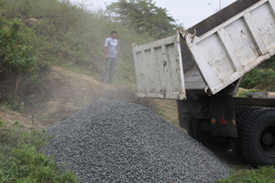
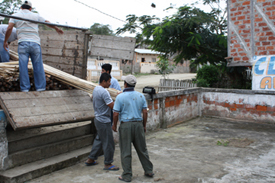
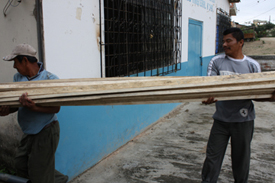
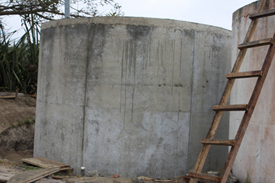
Simón supervises unloading gravel, Simón helps unload lumber
Simón carrying lumber, Completed water tank
9. Soccer Team
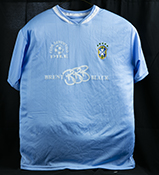
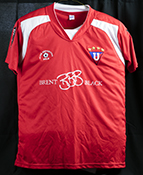
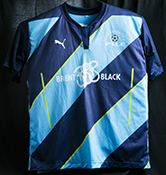
I still remember the day Simón told me he played on the Pile soccer team. Soccer’s cool. Exercise is good. What position? Goalie. Goalie!? Hands! Hands at risk. The best hat weaver in the known universe is inviting career-ending broken fingers on a regular basis. Yikes. Not good.
I bid Simón a hasty adios and drove an hour to the closest sporting goods store to buy the best goalie gloves in Ecuador. I wondered if Lloyd’s of London would insure Simón’s hands for a million dollars. Maybe, but they’d probably insist he stop playing goalie. And never juggle machetes.
As long as I was buying goalie gloves, it occurred to me to ask Simón: “ Does the team need uniforms?” Duh. Every team needs uniforms, and sponsoring uniforms for the Pile soccer team is not on Nike’s to-do list.
Okay. I’m in. I’ve always wanted to see my name on a team jersey.
10. Denomination of Origin protection for “Montecristi” Hats
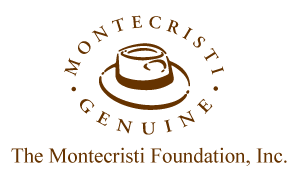
This is one of our most important projects ever. We are working to give legal protection to “ Montecristi” hats in the same way “ Bordeaux” and “ Champagne” wines, “ Idaho” potatoes, “ Jamaica Blue Mountain” coffee, and other regional produce and products are protected.
The MCF and The Panama Hat Company of the Pacific, Inc. helped fund legal action in Ecuador to win Denomination of Origin protection for Montecristi hats.
The World Intellectual Property Organization (WIPO) of the UN oversees, globally, Denomination of Origin applications. When we made our application, WIPO sent an inspector to Montecristi to evaluate the merits of the application on behalf of “Montecristi” hats. The UN inspector from WIPO endorsed our application for DO protection, meaning that he endorsed our assertion that both process and product of “ Montecristi” hats are unique and proprietary to the area.
Once the application was blessed by WIPO, the governmental agency of Ecuador that regulates and protects intellectual property rights (IEPI), conducted two similar inspections to verify the unique process employed to cut, prepare and weave the straw to create Montecristi hats. I helped write the descriptions of how traditional Montecristi hats are made.
In 2007, IEPI passed a resolution to award Denomination of Origin status and protection to “Montecristi” hats. Victory? Not exactly.
Unfortunately, the official DO resolution had no teeth in it —no certification system, no enforcement. So, nine years later, there is virtually no change in the real-world marketplace. Shops in Montecristi still have shelves loaded with Cuenca hats falsely labeled as genuine Montecristi hats. Stores all over the world still sell Cuenca hats fraudulently represented to be genuine Montecristi hats.
I estimate that more than half of the hats sold every year as Montecristi hats are not Montecrisit hats. This is the primary reason Montecristi hats are almost extinct. If everyone who thinks s/he is buying a Montecristi hat bought a for-real Montecristi hat, demand would almost double. And perhaps the art would be able to survive.
When I was in Montecristi in late 2015, the Director of Tourism for Montecristi promised me she and her department were going to remove all falsely labeled hats from the stores – in less than two weeks from the day of our conversation.
I checked to confirm she had done as promised, and received confirmation of my expectations – nothing has changed. Fraudulent sellers said they needed “more time” before they could comply.
More time?!!! It has been 9 years since the resolution was passed. For reasons beyond comprehension, the nation of Ecuador appears to be unwilling to make a genuine effort to save from extinction its own greatest art form. Please excuse me while I shut myself in my bedroom for an hour or two and alternate between cursing and weeping.
11.Fair Trade
It seems like a great idea, doesn’t it? No forced labor. No sweatshops. Pay workers fairly. Make sure their working conditions and hours are reasonable. All good. Sign me up.
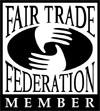
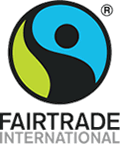
Paying the weavers and artisans more fairly than they’ve been paid for the past hundred years has been central to my efforts to save the art of fine hat weaving. Simple concept: if you want people to do something, pay them well enough that they will want to do it too.
I’ve also been actively trying to protect weavers’ health by providing safety masks to protect eyes and lungs, by bringing physicians and optometrists to the village, by paying for and delivering prescription medicines, by building a water project, and a few times I've even paid for surgery and prenatal care that weavers’ family members desperately needed but could not afford.
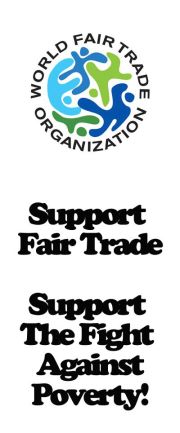
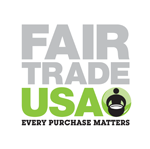
So I thought it was logical to become a Fair Trade merchant. Naturally, I Googled “fair trade organizations.” I discovered that there are quite a lot of them. Some operate only in certain parts of the world. Some specialize in a particular type of labor or product. Some actively inspect work sites and working conditions. Some help set labor prices. Some look like maybe they don't do much but sit in their offices and collect application fees.
I was still trying to figure it all out when I heard (on NPR) the news story about Victoria’s Secret and a Fair Trade scandal. The report was that farms, where cotton is grown for Victoria’s Secret products, were exploiting children. Certainly not the fault of Victoria’s Secret. They want to do the right thing and relied on the Fair Trade group of which they are/were members to implement and maintain the standards they claimed. But that particular Fair Trade group was not doing a good job, and workers, including children, were being exploited. So who watches the watchers?
Forget it. “Join Fair Trade Group” was scratched off the to-do list. I’ll just keep doing what I’ve been doing for many years: raising prices paid to weavers and artisans, protecting individual and public health as best I can and can afford. Fair enough?
12. Fighting Montecristo Cigars
”Montecristo” is one of the largest and most famous Cuban cigar brands. The company, based in Havana and Madrid, filed in Ecuador for trademark registration of “Montecristo” as a brand name for hats. If they succeed in winning trademark registration, in Ecuador, for “Montecristo” hats, then it seemed inevitable that the company will soon take legal action to prevent anyone from using “Montecristi” to describe hats.
They would claim that the name Montecristi is too similar to their registered trademark of Montecristo, that it would cause confusion in the market, and would damage sales of their brand. Therefore, they would claim, Montecristi should no longer be used to describe hats because it infringes on their trademark. Surely, a large multi-national corporation would never do such a thing, would never take legal action to prevent producers of Montecristi hats from properly calling their hats Montecristi hats. Would they? They say they wouldn’t. I preferred not to take a chance.
The MCF and The Panama Hat Company of the Pacific, Inc. funded legal action to block “Montecristo” as a registered trademark for hats in Ecuador. We won the initial ruling, they appealed, we won again, they appealed again, and so on. The cigar company finally agreed to withdraw “headwear” as part of their trademark application. Great. It’s settled then, right? In my dreams. For reasons beyond my understanding, the legal “battle” continued even though both parties had reached agreement. Sigh.
The legal dance continued for a while longer but it has finally been resolved for once and for all (I hope). We have successfully protected “Montecristi” hats from “Montecristo” hats.
Text and photos © 1988-2022, B. Brent Black. All rights reserved.
100% Secure Shopping
